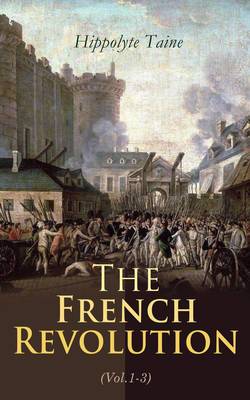Читать книгу The French Revolution (Vol.1-3) - Taine Hippolyte - Страница 22
На сайте Литреса книга снята с продажи.
VIII.—Paris in the hands of the people.
ОглавлениеTable of Contents
Henceforth it is clear that no one is safe: neither the new militia nor the new authorities suffice to enforce respect for the law. "They did not dare," says Bailly,1255 "oppose the people who, eight days before this, had taken the Bastille."—In vain, after the last two murders, do Bailly and Lafayette indignantly threaten to withdraw; they are forced to remain; their protection, such as it is, is all that is left, and, if the National Guard is unable to prevent every murder, it prevents some of them. People live as they can under the constant expectation of fresh popular violence. "To every impartial man," says Malouet, "the Terror dates from the 14th of July".—On the 17th, before setting out for Paris, the King attends communion and makes his will in anticipation of assassination. From the 16th to the 18th, twenty personages of high rank, among others most of those on whose heads a price is set by the Palais-Royal, leave France: The Count d'Artois, Marshal de Broglie, the Princes de Condé, de Conti, de Lambesc, de Vaudemont, the Countess de Polignac, and the Duchesses de Polignac and de Guiche.—The day following the two murders, M. de Crosne, M. Doumer, M. Sureau, the most zealous and most valuable members of the committee on subsistence, all those appointed to make purchases and to take care of the storehouses, conceal themselves or fly. On the eve of the two murders, the notaries of Paris, being menaced with a riot, had to advance 45,000 francs which were promised to the workmen of the Faubourg Saint-Antoine; while the public treasury, almost empty, is drained of 30,000 livres per day to diminish the cost of bread.—Persons and possessions, great and small, private individuals and public functionaries, the Government itself, all is in the hands of the mob. "From this moment," says a deputy,1256 "liberty did not exist even in the National Assembly … France stood dumb before thirty factious persons. The Assembly became in their hands a passive instrument, which they forced to serve them in the execution of their projects."—They themselves do not lead, although they seem to lead. The great brute, which has taken the bit in its mouth, holds on to it, and it's plunging becomes more violent. Not only do both spurs which maddened it, I mean the desire for innovation and the daily scarcity of food, continue to prick it on. But also the political hornets which, increasing by thousands, buzz around its ears. And the license in which it revels for the first time, joined to the applause lavished upon it, urges it forward more violently each day. The insurrection is glorified. Not one of the assassins is sought out. It is against the conspiracy of Ministers that the Assembly institutes an inquiry. Rewards are bestowed upon the conquerors of the Bastille; it is declared that they have saved France. All honors are awarded to the people-to their good sense, their magnanimity, and their justice. Adoration is paid to this new sovereign: he is publicly and officially told, in the Assembly and by the press, that he possesses every virtue, all rights and all powers. If he spills blood it is inadvertently, on provocation, and always with an infallible instinct. Moreover, says a deputy, "this blood, was it so pure?" The greater number of people prefers the theories of their books to the experience of their eyes; they persist in the idyll, which they have fashioned for themselves. At the worst their dream, driven out from the present, takes refuge in the future. To-morrow, when the Constitution is complete, the people, made happy, will again become wise: let us endure the storm, which leads us on to so noble a harbor.
Meanwhile, beyond the King, inert and disarmed, beyond the Assembly, disobeyed or submissive, appears the real monarch, the people—that is to say, a crowd of a hundred, a thousand, a hundred thousand individuals gathered together at random, on an impulse, on an alarm, suddenly and irresistibly made legislators, judges, and executioners. A formidable power, undefined and destructive, on which no one has any hold, and which, with its mother, howling and misshapen Liberty, sits at the threshold of the Revolution like Milton's two specters at the gates of Hell.
